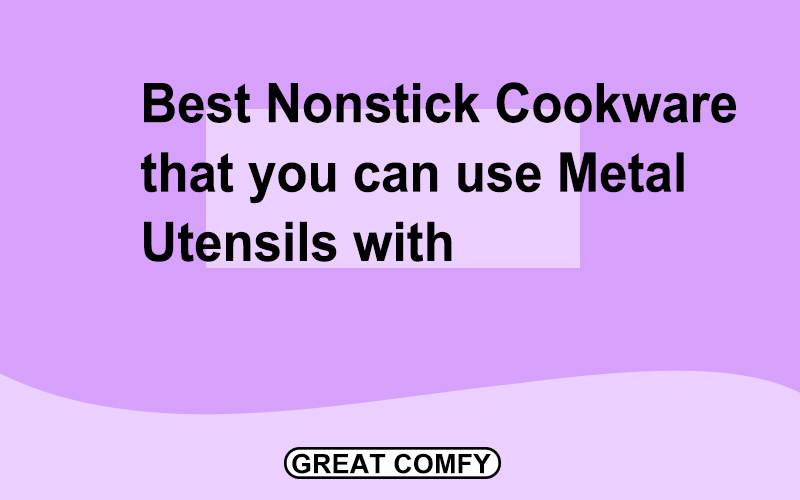Many home chefs have always preferred nonstick cookware due to its simplicity of use and ease of cleanup. At least, with nonstick cookware, they no longer have to scrub the hell outta any cookware to wash em’ off.
Provided you have a catch for Metal utensils, can nonstick cookware be used with them? Or better still, what nonstick cookware can you use with metal utensils?
This is all we’ll be talking about in this article.
Why Metal Utensils?
Generally, in the commercial kitchen industry, there are a lot of controversies with the use of Metal Utensils.
In fact, popular chefs like Chef Thomas Keller, have made statements about how they avoid metal utensils to prevent scratches.
But then, it ain’t bad if we try doing our thing. As a matter of fact, we are not alone, since there are still chefs that prefer metal utensils for the feeling it gives to the kitchen, right?
So, what makes Metal Utensils better?
First of all, compared to plastic or wooden utensils, metal utensils are more robust and can resist the rigors of regular use better.
This can result in better cooking performance because they are less prone to bend, distort, or break with time.
Furthermore, metal cookware conducts heat more effectively than plastic or wooden cookware, which can aid in the equal distribution of heat and, ultimately, produce better-cooked food.
It’s important to keep in mind though that not all nonstick cookware may be used with metal utensils. In fact, using metal utensils with the incorrect nonstick cookware type can scratch or damage the nonstick surface, which over time can cause food to stick and decrease performance.
For this reason, knowing what nonstick cookware would work perfectly with metal utensils is crucial.
What are the Best Nonstick Cookware That you can use Metal utensils with?
While you can easily get cookwares that could be used safely with metal utensils, that’s almost not the case for nonstick cookware, since they’re usually delicate.
Now, there are a number of things to take into account while shopping for nonstick cookware that are good with metal utensils.
Firstly, you would want to know the type of coating on the cookware.
Ceramic and hard-anodized nonstick cookware is our first options here.
This is because they offer a more robust nonstick surface that can tolerate metal utensils without scratching or chipping.
Related: Will Metal Utensils Scratch Stainless Steel?
Another excellent option is stainless steel nonstick cookware since they’re made of strong metal and resistant to chipping and scratches.
On the other hand, you may need to take into account the thickness of a non-stick cookware.
This is because it is less common for metal utensils to scratch or chip thicker nonstick coatings because they are generally more robust and resistant to damage.
The FDA and PFOA safety requirements are also two examples of certifications and safety standards that should be looked for, as well.
These certificates guarantee that the nonstick coating is safe for interaction with food and is devoid of hazardous chemicals.
Without much ado, below is our list of nonstick Cookware that you can use with metal utensils:
Stainless steel nonstick cookware:
The non-stick versions of stainless steel cookware are usually suitable for high-heat cooking techniques like searing or browning and more importantly, safe to use with metal utensils.
They’re also more durable and simple to clean thanks to the fact that they’re made from stainless steel.
Ceramic nonstick cookware:
This is another alternative that works well ¨C safe to use with metal utensils.
They usually have a tough ceramic coating that resists chipping and scratches and is devoid of dangerous chemicals like PFAS and PFOA, since they’re naturally nonstick.
It is also relatively light and simple to clean. However, note that it may not be able to withstand high-heat cooking methods because it is not as heat-resistant as the other options.
Hard-anodized nonstick cookware:
Hard-anodized nonstick cookware features a nonstick coating that doesn’t have dangerous chemicals like PFAS and PFOA and is constructed of scratch- and chip-resistant aluminum that has been hard-anodized.
These cookwares are usually strong, portable, and ideal for high-heat cooking techniques. It is, however, also the most expensive choice out of the three.
Checking what works better¡
It’s vital to remember that each of these choices has a special set of features and advantages and will accommodate various cooking requirements and preferences.
For instance, stainless steel nonstick cookware can be your best bet if you frequently cook things like meats at a high temperature.
On the other hand, Ceramic nonstick cookware can be the better option if you’re seeking for a lightweight solution and value safety and the environment.
Finally, while selecting your pick, it’s crucial to take into account your individual cooking requirements and preferences.
Again, note that every variety has advantages and disadvantages.
Although stainless steel nonstick cookware is the heaviest and most expensive option, it is also long-lasting and simple to clean.
On the other hand, while ceramic nonstick cookware is non-toxic and lightweight, it is not as heat-resistant as the other options.
The same goes for hard-anodized nonstick cookware which is lightweight, heat-resistant, and durable, but still remains the priciest option.
How to properly care for your nonstick cookware
Even when using metal utensils, proper care is necessary to ensure that your nonstick cookware lasts as long as feasible.
When cooking, the heat setting should be taken into account initially. In order to prevent overheating and warping of the cookware, it is advisable to use low to medium heat.
To prevent scratches and damage to the nonstick surface, you should wash the cookware by hand with a light detergent and a nonabrasive sponge. As well, avoid using metal sponges or aggressive cleansers since they can harm the nonstick surface.
In order to prevent scratches, you should also avoid stacking the cookware when storing it. If you are not planning to use metal, you should also use silicone or wooden utensils rather than metal ones.
Conclusion
For your nonstick cookware to last a long time and operate well, make sure it is safe to use with metal utensils. Nonstick cookware made of stainless steel, hard-anodized aluminum, and ceramic are all good options you could go with.
Hope you find this article helpful!




